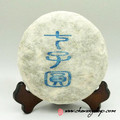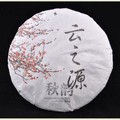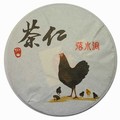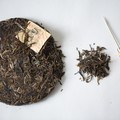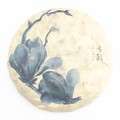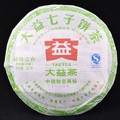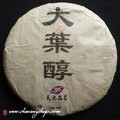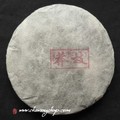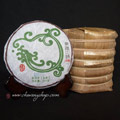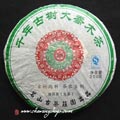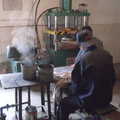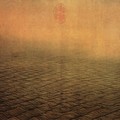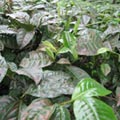Pu-erh - 4 and more stars - 2012
Tea by type
Tea by region
Tea by years and other
2012 Bulang Man Xin Long Wild Arbor Raw Puerh Cake 250g
 1 review
1 reviewProduct name (stamp on the wrapper) : Qi Zi Yuan This cake come from natural growing tea garden in Man Xin Long, Bulang mountain. This tea is powerfull with nice aroma, full and strong, bitter with fast huigan and very good energy. Great for long term aging! This cake is in limited quantity
2012 Yunnan Sourcing "Qiu Yun" Wild Arbor Raw Pu-erh tea of Yi Wu mountain
 1 review
1 reviewLate autumn harvest tea from wild arbor tea trees (between 60 and 80 year old) growing in the area of Yi Bi village of Yi Wu county. Entirely no spray tea from one family's tea garden. Hand-processed from start to finish, but without any smokiness! Classic Yi Wu taste, thick and full in the mouth. Sweet after-taste with some grass and mushroom notes. Qiu Yun (秋韵) means "Song of Autumn"
Luo Shui Dong 2012 Spring
 1 review
1 reviewThis cake is made from high quality gushu leaves sourced from Luo Shui Dong 落水洞 - a famous puer producing village in Yiwu. The farmers here are primarily Han ethnicity, known for their excellent hand-processing technique. This early spring tea produces is a clear bright yellow liquor, with a sweet, buttery mouthfeel. Because it is easy to drink when young, Luo Shui Dong is a good entry point for those new to sheng (raw) puer, or those who don’t like bitter or astringent flavors.
YiWu 2012 autumn
 1 review
1 reviewpressed by stone mold into 250 grams cakes, autumn maocha Massive sweetishness in the back of the mouth, already like in throat, fruity tones, buttery-biscuit like texture. The exact whereabouts of this tea garden is not known even to my 'buyer' friend in Jinghong
2012 EoT Bulang Puer Tea 400g
 1 review, 1 comment
1 review, 1 commentThis tea was a bit of an experiment for us. We'd found 2 different maochas from Bulang mountain, which were each excellent, but in different ways. One was old trees from around Manmu village, while the other was old trees from a few km away. We went back and forth, trying to choose one of them to press into cakes, and in the end decided to blend the two teas. The Manmu was very pure in flavour with a strong qi and strong ku (pleasant bitterness), the other was thicker in the mouth and more...
2012 Menghai "Spring of Menghai" Raw Pu-erh tea
 1 review, 1 comment
1 review, 1 commentPremium blend of first flush of spring tea * Batch 201This is a newer Menghai release, first released in 2005 and then again in 2006, 2007, and 2008. This recipe is comprised entirely of Menghai county early spring raw material from 2009-2011 mao cha. It's special characteristics are bitter, pungent, aromatic and thick and full in the mouth. The tea quickly causes salivating in the mouth and cha qi is warming. Tightly rolled leaves lock in the pungent aroma!...
2012 Mangfei "Da Ye Chun" Early Spring Raw Puerh Cake 400g
 1 review
1 reviewThis high quality old tree tea cake come from a small shop in Yongde. Using early spring material from tea trees about 80-300 years old. Mangfei is one of Yongde high mountains. Using traditional processing techniques -“sha-qing”(kill-green) in wok and sundried and carefully pressed to this 400g cake. Smell of dry leaves is strong and great. Tea soup is yellow green, sparkish clean and fragrant. Full, thick, with fast huigan. Aftertaste is floral sweet. This tea have some fantastic cooling...
2012 Mangzhi Huang Shan Cha Xiao Bing 200g
 1 review
1 reviewThis tea came from Mangzhi mountain which is located in the west of Xiangming village Mengla county, and next to the Gedeng mountain. Mangzhi tea mountain once had a very glorious history, but suffered a setback in the local wars during the end of the Qing Dynasty. Early spring harvest from wild arbor tea trees. Traditional “sha-qing” (kill-green) processing in wok and sun-dried. Select maocha was pressed by stone to this small pretty cake. A pleasing depth of...
2012 Chawangpu Jingmai Gu Shu Xiao Bing Cha 200g
 1 review
1 reviewThis tea is from Jingmai Da Zhai, grown on the Da Ping Zhang area, and is considered some of the finest Jingmai tea available. Another famous tea village is Mangjing. The Mangjing tea taste more simple and bitter, therefore be sold at a lower price. Jingmai mountain is famous for middle/little leaf tea (中小叶种茶) which is popular for its sweet taste and floral aroma. Jingmai Da Zhai is one of the most famous village and has the biggest ancient tea tree garden in Jingmai mountain,...
2012 Myanmar - Beyond The Small Mengsong Mountain Gushu Xiao Bing 200g
 1 review
1 reviewThe raw materials of this cake came from villages in Myanmar, its north border on small Mengsong mountain. Tea trees are about three hundreds years old and remain unmanaged. The natives living in isolated areas where transportation is difficult, they carry the tea on the backs and walk to the border. The tea is not expensive but does not come by easily.
Theme
Quotes
„The leaves are then dry pan-fried using a large wok in a process called "kill green" (殺青; pinyin: shā qīng), which arrests most enzyme activity in the leaf and prevents full oxidation. After pan-frying, the leaves are rolled, rubbed, and shaped into strands through several steps to lightly bruise the tea and then left to dry in the sun.“
Latest posts
07.06.2025 @ 07:48:53 - lalo233:
The unforgiving landscapes of Arrakis in Dune: Awakening demand a mastery of combat....
07.06.2025 @ 07:48:50 - lalo233:
The unforgiving landscapes of Arrakis in Dune: Awakening demand a mastery of combat....
01.01.2016 @ 18:14:35 - Eternal Spring:
WeRateTea.com wish you all the best for 2016!...
07.12.2015 @ 09:07:02 - sypalino:
I decided to taste this tea 2 weeks after delivery. The cake is lightly pressed, so...
09.11.2015 @ 21:58:19 - Eternal Spring:
Comparison of 2013 Bada Pu-erh.sk with <a...
09.11.2015 @ 09:34:07 - Eternal Spring:
Lao Yu 2013 is now about 2,5 years old tea and out of this 1,5 year stored in Europe....
09.11.2015 @ 09:33:11 - Eternal Spring:
Comparison of all three Lao Yu is now done :)
15.10.2015 @ 11:06:37 - Eternal Spring:
2015 Chawangpu Collection – I can only tell, that all teas are very good :)
09.10.2015 @ 10:31:19 - Eternal Spring:
It was quite long and difficult tasting to make a decision… There is still quite...
24.01.2015 @ 16:55:57 - Eternal Spring:
WeRateTea.com wish you all the best for 2015!...
Tea by region
We will help you with tea selection.
Do you like quality loose tea?
We will help you to find the right one for you. Be inspired by tea ratings of other tea lovers. Rating stars could help you.


Review your cup of tea.
Review the tea you are drinking and help other tea lovers to find the right cup of tea.






 Shops
Shops
